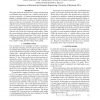Free Online Productivity Tools
i2Speak
i2Symbol
i2OCR
iTex2Img
iWeb2Print
iWeb2Shot
i2Type
iPdf2Split
iPdf2Merge
i2Bopomofo
i2Arabic
i2Style
i2Image
i2PDF
iLatex2Rtf
Sci2ools
123
click to vote
ICIP
2006
IEEE
2006
IEEE
Optimal Unequal Error Protection with User Cooperation for Transmission of Embedded Source-Coded Images
This paper studies the transmission of images encoded using an embedded source encoder over a wireless network allowing user cooperation. A dynamic programming algorithm is applied to optimally allocate to each source coded packet error protection in the form of a choice of channel code and a decision on the use of cooperation. The results show that for degraded source-destination channels, the use of user cooperation on all source coded packets significantly improves the reconstructed quality. As the source-destination channel improves the optimal policy becomes a hybrid that uses user cooperation only for the most important source packets. When the source destination channel is sufficiently good, all source packets are sent without cooperation. Thus, a test is presented to estimate the channels states when cooperation is first used.
Embedded Source Encoder | ICIP 2006 | Image Processing | Important Source Packets | Source Coded Packets | Source Destination Channel | User Cooperation |
| Added | 22 Oct 2009 |
| Updated | 22 Oct 2009 |
| Type | Conference |
| Year | 2006 |
| Where | ICIP |
| Authors | Andres Kwasinski, K. J. Ray Liu |
Comments (0)

